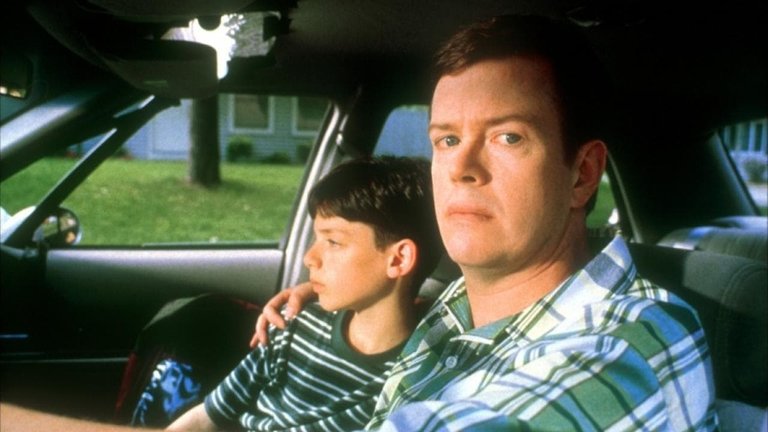Film Review: Happiness (1998)

In the late 1990s, many cinephiles began to wonder who was going to succeed Quentin Tarantino as the "coolest" of all American independent filmmakers. One of the candidates was Todd Solondz, playwright and director whose 1998 black comedy Happiness won the FIPRESCI prize at the Cannes Film Festival, thus giving him a bit of the credentials Tarantino had won in Cannes a few years earlier with Pulp Fiction.
The script, written by Solondz, doesn't have a firm plot and represents a series of subplots connected through the characters of three Jordan sisters who grew up in New Jersey suburbs. Joy Jordan (played by Jane Adams) has reached 30 years of age, but is still at odds about what to do with her life; while her dream of a singing career remained a dream, attempts to find happiness with men usually end in failure. Helen Jordan (played by Lara Flynn Boyle) is an accomplished poet and successful author, but is nevertheless unhappy with her life and finds release in obscene phone calls sent by her pathetic neighbour Allen (played by Philip Seymour Hoffman). Trish Jordan Maplewood (played by Cynthia Stevenson) appears happy because she lives in a family idyll brought by her husband Dr. Bill Maplewood (played by Dylan Baker), a respectable psychotherapist and wonderful father who does his best to guide his 11-year-old son Billy (played by Rufus Read) through the challenges of puberty. He is, however, also a paedophile who feels an uncontrollable lust towards Billy's friends. At the same time, the sisters' father Lenny (played by Ben Gazzara) wants to leave his wife Mona (played by Louise Lasser) after forty years of marriage.
Happiness actually never had the chance of doing for Solondz what Pulp Fiction had done for Tarantino. The reason lies in its rather dark subject matter, involving all kinds of sexual anomalies, including paedophilia, as well as Solondz uncompromisingly showing certain bodily fluids that were used in There's Something About Mary one year earlier. This made the censors at the MPAA Ratings Board apoplectic and ultimately led to Happiness being unrated and thus having extremely limited distribution in the USA. Those who had the opportunity to watch Happiness were, on the other hand, given an experience that, in some way, condensed the work of some of the most notable names of 1990s American independent and art cinema. The plot takes place in Solondz's native New Jersey, a state which also inspired Kevin Smith for his works. The somewhat unusual narrative structure may remind viewers of Tarantino's films, while the detailed description of perversion and depravity under the facade of middle-class milieu is very much like some of the best works of David Lynch. Despite all the censorship brouhaha and controversies, Happiness is actually quite restrained and not too explicit in its depiction of sexuality. And despite its seemingly chaotic structure, it is a well-organised and very disciplined film – all the plots and characters are actually connected. Solondz puts all kinds of dark desires into his characters and, furthermore, allows those characters to have those desires fulfilled, but in a way that creates a lot of black humour. And the humour is exactly what Happiness needed; if taken as straight serious drama, the film would have been unbearably depressive. The title of the film is ironic, but happiness appears unattainable for most of the characters except the one in the last scene.
The greatest value of Happiness comes from Solondz's ability to portray his characters as human beings, regardless of how their actions might be abhorrent and unacceptable. Solondz doesn't try to judge and often leaves viewers to come to their own conclusions, often having to deal with characters' contradictions. He is aided by a very good cast and especially Dylan Baker in a very difficult and potentially career-wrecking role of Dr. Maplewood. While this character in any other film would have been shown as nothing more than a vile paedophile, here he is shown as a complex character who is, despite his "affliction", able to function as a good father and during the memorable scene with his son, when he confesses his crimes with brutal honesty, some viewers might even feel a little bit of sympathy for him. Although there are some issues with the pacing and the subplot dealing with the Jordan sisters' parents might have been left on the cutting room floor, Happiness is a very good film that didn't deserve to sink into obscurity. In 2009, Solondz directed Life During Wartime, a film that represents a semi-sequel to Happiness.
RATING: 8/10 (+++)
Blog in Croatian https://draxblog.com
Blog in English https://draxreview.wordpress.com/
Leofinance blog https://leofinance.io/@drax.leo
Unstoppable Domains: https://unstoppabledomains.com/?ref=3fc23fc42c1b417
Hiveonboard: https://hiveonboard.com?ref=drax
Bitcoin Lightning HIVE donations: https://v4v.app/v1/lnurlp/qrcode/drax
Rising Star game: https://www.risingstargame.com?referrer=drax
1Inch: https://1inch.exchange/#/r/0x83823d8CCB74F828148258BB4457642124b1328e
BTC donations: 1EWxiMiP6iiG9rger3NuUSd6HByaxQWafG
ETH donations: 0xB305F144323b99e6f8b1d66f5D7DE78B498C32A7
